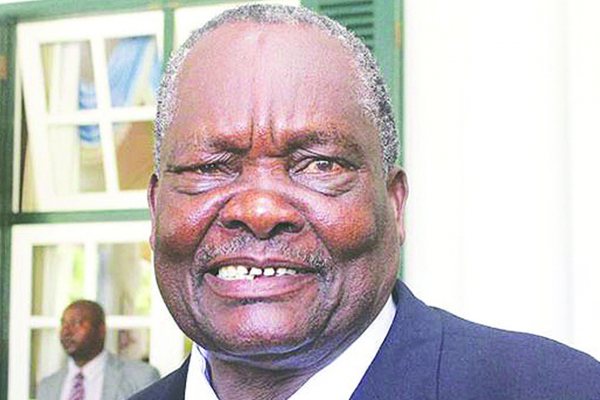
NATIONAL Peace and Reconciliation Commission (NPRC) chairperson Retired Justice Selo Masole Nare says currently, his commission’s number one priority is ensuring that there is peace during the elections period.
By VENERANDA LANGA
Thereafter, Nare says his commission will be seized with dealing with issues of national healing relating to the Gukurahundi period, including visiting victims. The following are excerpts of an interview between Nare (SMN) and Southern Eye senior parliamentary reporter Veneranda Langa (ND) on the NPRC’s role during the elections.
ND: What is the role of the NPRC during these elections?
SMN: The NPRC is a product of the 2013 Constitution and our sermon is that of peace. We work with government, civic society and churches in order to bring peace.
The world right now is interested in whether we are going to hold peaceful elections, particularly since we just have the new dispensation and the expectations are that we need to maintain a peaceful environment.
To achieve that peace, we need the NPRC to be all over the country.
Unfortunately, there are only nine commissioners and so we will need to rope in other parties to assist us because section 6 of the NPRC Act allows us to bring in the civic society to assist us.
- Chamisa under fire over US$120K donation
- Mavhunga puts DeMbare into Chibuku quarterfinals
- Pension funds bet on Cabora Bassa oilfields
- Councils defy govt fire tender directive
Keep Reading
ND: What is the Peace Pledge all about?
SMN: Our NPRC Act talks about peace, and it is necessary that it is inculcated to all stakeholders during the elections to know that it is necessary to have peaceful elections.
We felt that as the NPRC, we should bring together all political parties to sign the Peace Pledge, which is a commitment to ensure there is peace during the elections.
The role of the Zimbabwe Electoral Commission (Zec) is to ensure there are free and fair elections, and our role is to maintain peace.
Therefore, peace dialogue with political parties is necessary and we cannot dialogue with them without making them sign a Peace Pledge.
ND: Is it mandatory that all political parties have to sign the Peace Pledge? What happens if they refuse to sign?
SMN: The three political parties in Parliament have already confirmed that they will sign the Peace Pledge. We have contacted all other political parties and I think they are eager to sign it.
This is just a moral obligation that the parties want peace during the elections.
If a political party is not interested in signing it, we will not force them, but we will encourage all political parties to sign it because it is to the advantage of the safety of their followers.
ND: Have you recorded any cases of conflict yet during this pre-electoral period and what are the conflicts?
SMN: Yes, already there are conflicts pertaining to the voters’ roll and issues that it was not produced on time.
However, it is an area which is not in our purview and needs to be dealt with by Zec.
Other conflicts were to do with registering of voters and disenfranchisement of voters that were registered during the time of inspection of the voters’ roll. But Zec said those would not vote now, but in the 2023 elections.
We have also discovered that a lot of people that were affected by the Gukurahundi violence have now relocated to other countries and have since obtained identity documents in those countries.
ND: Is the commission going to look at national healing of the Gukurahundi victims?
SMN: The elections are our number one priority for now. We will deal with issues like the Gukurahundi, as we move on as a commission.
Healing and reconciliation is necessary on issues related to Gukurahundi.
Last week, we engaged the chiefs of the areas affected during the Gukurahundi era so that they identify the victims.
Some of them were affected by failure to get birth and death certificates.
My belief is that a moratorium must be passed to ensure they obtain birth documents and to heal the wounds.
ND: But people from Matabeleland are demanding apologies from those behind the Gukurahundi massacres. Are you going to engage the leaders as well?
SMN: Our roadmap does include engagement of leaders over the Gukurahundi issues. It is important to bring closure to the issue.
ND: How do you view this pre-electoral period? Is it peaceful?
SMN: We have conflicts here and there, but they are not of such magnitude as the 2008 elections.
The trend has changed from inter-party electoral violence. This time, the violence is intra-party and we have seen people from the same political party taking each other to the courts.
We have also observed that there is a lot of hate language, especially on social media.
There also have been cases of violence on female candidates, where the Women’s Coalition of Zimbabwe submitted reports of violence on women which we are dealing with. One of the reports involves MDC-T president Thokozani Khupe. Time is not on our side to deal with all conflict situations, and our hope is that the media will assist us to preach messages of peace.
ND: What is going to happen with the life of the NPRC, which is supposed to have a 10-year lifespan according to the Constitution?
SMN: The Constitution says the NPRC should have a 10-year lifespan, but that is a question we have put to the lawmakers to fix.
We are looking forward to the amendment of the NPRC Act, which was gazetted on January 5, 2018 to ensure that its lifespan is extended.
After the Act was gazetted, not much has been done in terms of contacting victims and perpetrators of conflicts.
There is need for extension so that we serve the full 10 years, and extension is possible.







